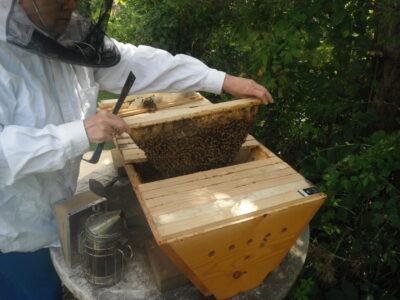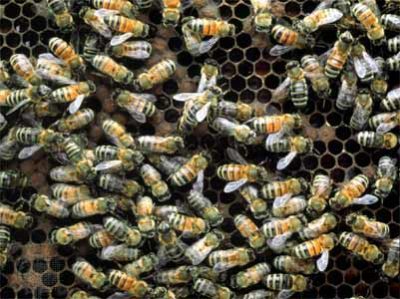
image credit blog.beeculture.com
Monsanto held a Bee Health Summit to “introduce” the company to beekeepers. Those who have been fighting cold brood and a loss of
queens to Roundup Ready crops and other chemical pesticides are well aware of who Monsanto is and the impact of the biotech giant’s products. I can’t help but conjure up images of chickens attending a longevity conference hosted by the fox when thinking about the three-day Monsanto bee summit.
The honeybee population is decreasing at alarming rates. A majority of beekeepers have cited concerns about the negative impact Roundup Ready and similar products have on bee colonies. Monsanto bee researcher Jerry Hayes had this to say about the biotech company’s beekeeper summit:
“The goal in my mind was pretty simple, to connect the beekeeping industry more closely to Monsanto, and to connect Monsanto more closely to the beekeeping industry. They’ve heard all the big scary stuff about the company. We want to raise their comfort level.”
Big and scary are two very accurate terms to use when describing Monsanto. Bayer and Syngenta also produce pesticides which contain neonicotinoids. The chemical has been linked to worldwide honeybee population decreases, commonly referred to as bee colony collapse disorder.
During the Monsanto bee summit, a “new technology” which will allegedly control the varroa mite, was discussed. Controlling the little insect may be a factor in bee population decreases, according to some bee experts. A University of Kentucky report had this to say about varroa mites:
“Varroa mites are external honeybee parasites that attack both the adults and the brood, with a distinct preference for drone brood. They suck the blood from both the adults and the developing brood, weakening and shortening the life span of the ones on which they feed. Emerging brood may be deformed with missing legs or wings. Untreated infestations of varroa mites that are allowed to increase will kill honeybee colonies. Losses due to these parasitic mites are often confused with causes such as winter mortality and queenlessness if the colonies are not examined for mites.”
Monsanto Vice-President for Global Straegy Kerry Preete stated that the biotech company thinks they have something to offer in the battle against varroa mites and also noted that honeybee health is “critical” to the Monsanto mission. If stopping bee colony collapse disorder was truly a top priority for the biotech giant, they would halt production of Roundup Ready immediately. During the course of the past 10 years, the honeybee population in the United States has decreased by approximately 30 percent each year.
The Ultimate Guide to Keeping Stronger Colonies and Healthier, More Productive Bees
While varroa mites do likely play a role in bee population decreases, exposure to strong pesticides is a far more serious concern for most beekeepers. Honeybees pollinate about 70 percent of the food we eat; if the bees die, so will a lot of the global population. Each year bees pollinate almost $20 billion in crops in the United States alone.
During the final day of the Monsanto bee summit, the formation of a Honey Bee Advisory Council was announced. The group will be comprised of government sector staffers, biotech industry associations, academics, and beekeepers. Since government officials and Monsanto associates will be involved, I am sure a timely and eco-friendly solution will evolve from council meetings. The group will reportedly act as an adviser to Monsanto explicitly on the topic of bee health.
Several of Monsanto’s purchases include Beeologics, an Israeli company. The folks at Beeologics feel they were on the road to saving the bees thanks to regulatory RNA discoveries. The Beeologics researchers were using regulatory RNA to modify how a plant works and want to use the same process to fight the varroa mites. A mixture would be fed to honeybees and the mites would ultimately ingest the liquid. A gene inside the varroa mites that “transmits viruses” would effectively be turned off. The working theory at Monsanto is that the solution consumed by the bees would ultimately control the mite population and the virus.
 Beekeepers at the Monsanto bee summit were understandably very skeptical about utilizing another chemical in their already struggling hives. As at least one summit attendee pointed out, you would have to keep buying the solution and giving it to the bees or the varroa mite would come back into the hive. Possible long-term health effects of the bee solution are unknown. The ability to label honey which stems from bees consuming the Monsanto solution as an organic product could also be a concern for beekeepers.
Beekeepers at the Monsanto bee summit were understandably very skeptical about utilizing another chemical in their already struggling hives. As at least one summit attendee pointed out, you would have to keep buying the solution and giving it to the bees or the varroa mite would come back into the hive. Possible long-term health effects of the bee solution are unknown. The ability to label honey which stems from bees consuming the Monsanto solution as an organic product could also be a concern for beekeepers.
A Monsanto representative claimed that the biotech giant has no intention of creating genetically modified bees. Rumors to the contrary have abounded online once the story about an Illinois beekeeper went viral. Veteran beekeeper Terry Ingram believed he had a honeybee queen that, for an unknown reason, has become immune to Roundup Ready. Ingram spent nearly two decades monitoring, recording, and researching the habits and health of his bee colonies—until a government agency raid took them all away. The Illinois beekeeper has been recognized on a national level for his conservation efforts.
Roundup Ready queen bees report previously published by Off The Grid News:
“After his bee population was seized, a story about Terry Ingram stating the he had $5,000 worth of bees and bee hives stolen appeared in the Prairie Advocate. Not long after the article was published, the reporter received a call from the local county Farm Bureau manager wanting to know where the bee story information had originated. The paper was told that the Illinois Department of Agriculture had not stolen but confiscated and destroyed the bees because of foulbrood. He [Ingram] strongly believes that the collected data indicates that both the chemical pesticide and Colony Collapse Disorder are to blame for the dwindling bee population. Had the state not taken and destroyed his Round-Up Ready queen bee, Ingram was going to raise her female offspring to determine if there was a genetic resistance to the pesticide present. When the Illinois Department of Agriculture seized and destroyed the beekeeper’s colony, they ruined 15 years of research on the effects of Round-Up on honeybees.”
British bee experts believe that if the dire state of the bee population is not corrected, we could be living in a world without bees in 10 years. Albert Einstein once said that if bees disappear from the globe, man would only have four years left to live. While the bee advisory council might garner Monsanto some good PR, saving the bees is far too important to our survival to entrust the task to a biotech company.
 Off The Grid News Better Ideas For Off The Grid Living
Off The Grid News Better Ideas For Off The Grid Living




